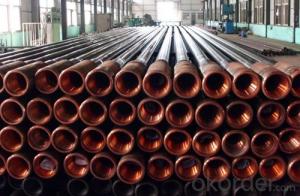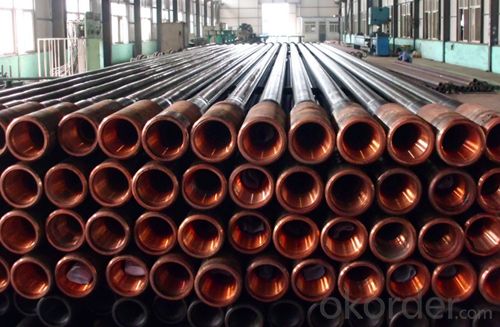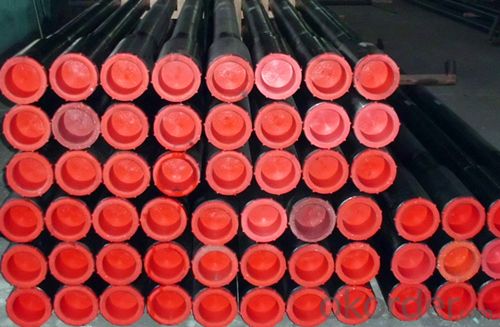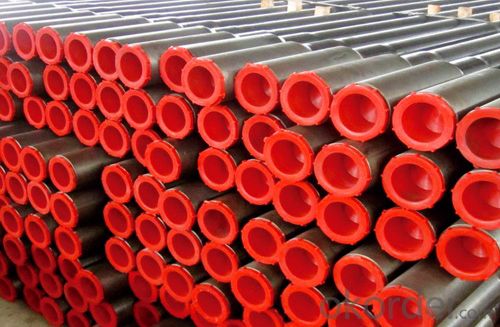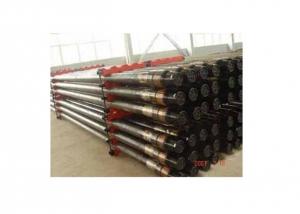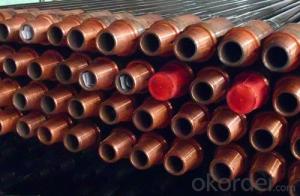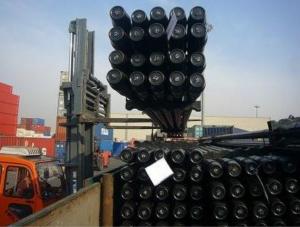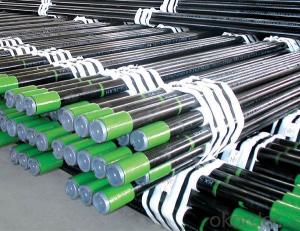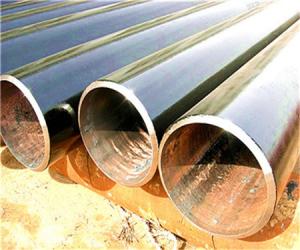Non-dig Drill Pipe with API Spec 5DP Standard
- Loading Port:
- Tianjin
- Payment Terms:
- TT OR LC
- Min Order Qty:
- 20 m.t.
- Supply Capability:
- 1000 m.t./month
OKorder Service Pledge
OKorder Financial Service
You Might Also Like
1. Structure of Non-dig Drill Pipe Description
We can supply all kinds of drill pipes that are consistent with API SPEC 5DP. Advanced drill pipe production lines can transfer the welding parameters to the best position to ensure the quality of welding zone; the heat treatment process with the feature of internal and external cooling at the same time can make a more reliable and stable mechanical character. Application of automatic weight, length measurement and automatic spray records can ensure products' traceability. Application of thickening and heating lines and 1250 tons of upsetting machine can ensure the thickening size meet the standard of API SPEC 5DR Using of CN furnace for whole pipe body heating and quenching, tempering machine's advanced heat treatment process can ensure the pipe's mechanical character. Tube hydraulic straightening machine ensures the straightness and coaxiality of pipe body.
Non-dig drill pipeNon-dig drill pipe is a tool applicable for transferring torque and tension of drillers in the process of directional drilling construction.
2. Main Features of Non-dig Drill Pipe
1) Advanced test for quality
2) MTC provided
3) API Standard
3. Non-dig Drill Pipe Images
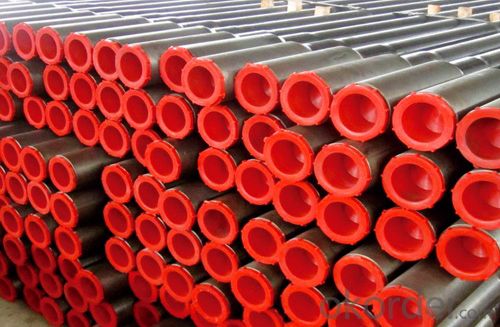
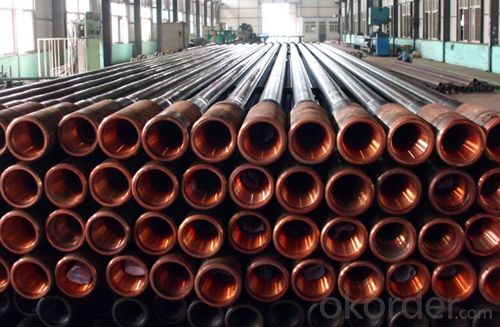
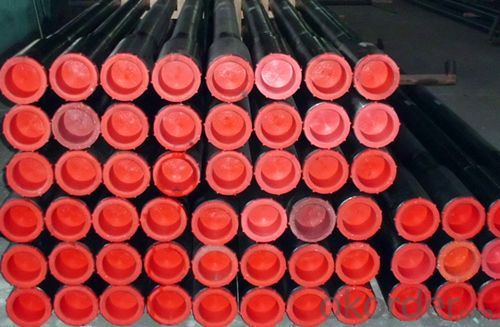
4. Non-dig Drill Pipe Specification
Length: 1,000mm ~ 9,000mm;
Diameter: 76mm (3”) ~ 146mm (5-3/4”);
Wall Thickness: 5.5mm ~ 8mm;
Connection Thread: 2 3/8”, 2-7/8”, 3-1/2”, 4 1/2” API Reg. or API IF Thread.
5. FAQ of Non-dig Drill Pipe
We have organized several common questions for our clients,may help you sincerely:
①How about your company?
One of the leading manufacturers and suppliers specializing in drill pipe products in China, mainly offering drill pipes including oil drill pipe, water well drill pipe, flat drill pipe, geological drill pipe and non-dig drill pipe.
Other than drill pipes we are also capable of supplying a wide variety of pipeline accessories, drill joints, steel pipe fittings, valves etc. consists of our one-stop sales. The integrated sales & service ensures customers with various demands an easier access for purchasing management.
②How to guarantee the quality of the products?
We have established the international advanced quality management system,every link from raw material to final product we have strict quality test;We resolutely put an end to unqualified products flowing into the market. At the same time, we will provide necessary follow-up service assurance.
③How long can we receive the product after purchase?
In the purchase of product within three working days, We will arrange the factory delivery as soon as possible.
- Q: What are the different methods of pipe cutting for steel pipes?
- There are several methods of cutting steel pipes including manual methods such as hacksaw cutting and abrasive cutting, as well as more advanced methods like plasma cutting, laser cutting, and water jet cutting. Each method has its own advantages and is selected based on the specific requirements of the project.
- Q: What does seamless steel tube mean? What are the main uses? What are the classifications?
- Seamless steel pipe having a hollow cross section, used as a conduit for conveying fluids, such as pipelines for transporting petroleum, natural gas, gas, water, and certain solid materials. Compared withsteel and roundsteelinsolid, flexural torsional strength in the same time, the weight is light, is a kind of economic section steel, widely used in the manufacture of structural parts and mechanical parts, such as the oil pipe, automobile transmission shaft, the bicycle frame and steel construction with scaffold with steel pipe manufacturing ring parts can be improved the utilization rate of materials, simplify the manufacturing process, material saving and working hours, has been widely used to manufacture steel tube.
- Q: Can steel pipes be used for plumbing?
- Yes, steel pipes can be used for plumbing. They are commonly used in commercial and industrial applications due to their durability and strength. However, they are less common in residential plumbing due to their higher cost and the availability of alternative materials such as copper and PVC.
- Q: What is the creep resistance of steel pipes?
- The creep resistance of steel pipes refers to their ability to withstand deformation or elongation over time when subjected to high temperatures and constant stress. Steel pipes are known for their excellent creep resistance due to the inherent strength and stability of the material. The specific creep resistance of steel pipes can vary depending on factors such as the alloy composition, heat treatment, and the operating conditions they are exposed to. Creep is a phenomenon that occurs at elevated temperatures where materials slowly deform under constant stress. In the case of steel pipes, this can be a concern in applications where they are exposed to high temperatures for prolonged periods, such as in power plants, industrial furnaces, or steam pipelines. The resistance to creep deformation is crucial to ensure the structural integrity and longevity of the pipes. Steel pipes are often designed and manufactured with alloys that have high creep resistance properties, such as chromium-molybdenum (Cr-Mo) steels or nickel-based alloys. These alloys exhibit excellent mechanical strength, good thermal stability, and resistance to oxidation and corrosion, all of which contribute to their superior creep resistance. Furthermore, heat treatment processes like quenching and tempering can significantly enhance the creep resistance of steel pipes. These treatments involve controlled heating and cooling cycles that optimize the microstructure of the steel, increasing its resistance to deformation and improving its overall performance at high temperatures. It is important to note that the creep resistance of steel pipes is typically specified by industry standards and codes, such as the American Society of Mechanical Engineers (ASME) Boiler and Pressure Vessel Code. These standards define the allowable stress levels and design criteria for various steel pipe applications, ensuring that they meet the required safety and performance standards. In summary, steel pipes are known for their excellent creep resistance due to their inherent strength, stability, and resistance to high temperatures. The specific creep resistance of steel pipes can vary depending on factors such as alloy composition, heat treatment, and operating conditions. Proper design and adherence to industry standards are crucial to ensuring the desired creep resistance and overall performance of steel pipes in various applications.
- Q: What is the composition of steel pipes?
- Steel pipes are primarily composed of iron and carbon, with small amounts of other elements such as manganese, silicon, and sulfur.
- Q: How are steel pipes used in the telecommunications infrastructure?
- Steel pipes are used in the telecommunications infrastructure primarily for underground cable installation. They serve as protective conduits that house and secure the fiber optic cables, providing a reliable and durable solution for long-distance communication.
- Q: What are the different methods of welding steel pipes?
- There are several different methods of welding steel pipes, including shielded metal arc welding (SMAW), gas tungsten arc welding (GTAW), gas metal arc welding (GMAW), flux-cored arc welding (FCAW), and submerged arc welding (SAW). Each method has its own advantages and is used depending on factors such as the thickness of the pipes, the type of steel being welded, and the desired outcome.
- Q: Can steel pipes be used for conveying corrosive substances?
- No, steel pipes are not recommended for conveying corrosive substances as they are prone to corrosion themselves.
- Q: How to make the steel pipe spray paint is not easy to fall off?
- First you will rust steel, to clean, good quality alkyd rustproof paint, completely dry after brushing paint, color to see his kind of love.
- Q: What are the common applications of seamless steel pipes?
- Seamless steel pipes have numerous common applications in various industries due to their unique properties. Here are some of the most common applications of seamless steel pipes: 1. Oil and gas industry: Seamless steel pipes are widely used in the oil and gas industry for the transportation of oil, gas, and other fluids. They are preferred due to their high strength, durability, and resistance to corrosion, making them suitable for harsh environments. 2. Construction and infrastructure: Seamless steel pipes are extensively used in construction projects, including the construction of buildings, bridges, and tunnels. They are ideal for structural applications due to their ability to withstand heavy loads and provide excellent strength and stability. 3. Automotive industry: Seamless steel pipes are a crucial component in the manufacturing of automotive parts, such as exhaust systems, engine components, and hydraulic systems. They offer high strength, reliability, and resistance to heat, making them suitable for demanding automotive applications. 4. Mechanical and engineering applications: Seamless steel pipes find usage in various mechanical and engineering applications, including machinery, equipment, and manufacturing processes. They are commonly used for carrying fluids, gases, and steam, as well as for the transmission of power in machinery. 5. Power generation: Seamless steel pipes are extensively used in power plants for the transportation of steam and hot water. They are capable of withstanding high pressure and temperature, making them ideal for power generation applications. 6. Petrochemical industry: Seamless steel pipes are crucial in the petrochemical industry for the transportation of various chemicals, gases, and liquids. They have excellent resistance to corrosion, which is essential when dealing with hazardous and corrosive substances. 7. Mining industry: Seamless steel pipes are used in the mining industry for various applications, including the transportation of slurry, water, and other mining-related fluids. They offer durability, reliability, and resistance to abrasion, making them suitable for the challenging mining environment. 8. Aerospace industry: Seamless steel pipes find applications in the aerospace industry for manufacturing aircraft components, such as hydraulic systems, fuel lines, and structural parts. They provide high strength-to-weight ratio and resistance to extreme temperatures and pressure. Overall, the common applications of seamless steel pipes span a wide range of industries, thanks to their exceptional properties, including strength, durability, resistance to corrosion and high temperatures, making them an essential component in various industrial processes and infrastructure development.
Send your message to us
Non-dig Drill Pipe with API Spec 5DP Standard
- Loading Port:
- Tianjin
- Payment Terms:
- TT OR LC
- Min Order Qty:
- 20 m.t.
- Supply Capability:
- 1000 m.t./month
OKorder Service Pledge
OKorder Financial Service
Similar products
Hot products
Hot Searches
Related keywords
